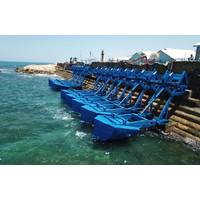European Consortium to Convert Coal-Fired Power Plant to Biomass
The European ARBAHEAT consortium will start a research project to investigate the conversion of the ENGIE Ultra-SuperCritical coal-fired Rotterdam power plant into a biomass-fired heat and power plant this month.
The innovative technology used to produce the required steam treated biomass has been developed by the Norwegian company Arbaflame AS.
Goal of this showcase is to investigate the technical possibilities of cost-effectively converting the coal-fired power plant into a flexible 100% sustainable biomass fired plant, which will be able to deliver sustainable electricity as well as sustainable heat. For this project the consortium will receive over € 19 million EU funding.
The ARBAHEAT project is aimed at integrating an innovative biomass pre-treatment installation into the ENGIE coal-fired power plant. The installation will produce so-called steam treated biomass pellets from sustainable biomass, which complies with the most stringent EU sustainability criteria. These pellets were specifically chosen as energy source as they have comparable characteristics to coal.
Compared to normal biomass pellets they are more water resistant, have a higher energy density and have almost the same burning characteristics to coal. This will facilitate the use in an existing power plant and significantly reduce costs for converting the existing coal-fired power plant to biomass.
The European ambitions to limit CO2 emissions has a significant impact on the operation of coal-fired power plants and on the required balancing power to support the grid supplementary to solar and wind energy.
Retrofitting some modern existing coal-fired power plants with the ARBAHEAT concept could offer a significant contribution to the realisation of decarbonisation targets in Europe by adding sustainable heat and power flexibility.
The state-of-the-art ENGIE power plant is the perfect candidate for this first demonstration project because of its size and strategic location in the port of Rotterdam.
“The plant can play an important role in the harbour of Rotterdam not only supplementary to wind and solar but also in providing heat. However at this moment there is no viable business case to convert a coal-fired powerplant into a 100% sustainable and flexible biomass plant. A successful demonstration will allow for delivering large amounts of sustainable electricity and heat to the surrounding area”, says manager Coal ENGIE, Jeroen Schaafsma.
Besides energy, the project will also produce other biological side-products from the steam treatment process, such as biochemicals, allowing for an even more sustainable and cost-effective conversion of the power plant.
This four-year demonstration project brings together European expertise from the energy sector, the scientific community and the renewable energy sector committed to achieving the EU sustainability goals. In addition to ENGIE (NL) Arbaflame (NO), PNO Consultants (NL), TNO (NL), Sintef (NO), Free University of Brussels (VUB, BE), Port of Rotterdam (NL) and University of Bergen (NO) are also members of the ARBAHEAT consortium.
The consortium partners have all the relevant knowledge and resources available to make the ARBAHEAT project to a success. With the € 19 million grant the EU acknowledges the sustainability of the project and its targets and supports the implementation of this demonstration project.








